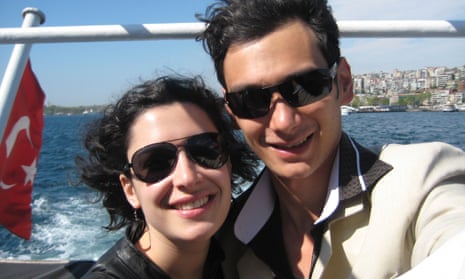‘“She would come to my house to teach me English, and I would teach her Uzbek,” remembers Akmal. “But my motive,” says Sarah, “was to get as physically close as I could – so how do you turn a lesson into a date?” They ended up kissing.
This wasn’t real life, but a scene they developed and performed as part of a theatre course in Tashkent, Uzbekistan, in 2009. Akmal was from Uzbekistan; Sarah, from the US. Both had enrolled for three years at the renowned Ilkhom Theatre of Mark Weil.
“Everything we felt chemically and emotionally was on stage for everyone to see,” says Sarah. “Our professor saw it, our classmates saw it. We were like, ‘We’re just kissing because it’s a sketch.’ But it was heated. It was very magnetic.”
Akmal remembers her arriving at the start of the course. “She was all big eyes, in shock, just waving at everyone,” he says. He invited her for an ice-cream at the end of one day, but with neither able to communicate with the other, Sarah turned him down. “I didn’t even know how to appropriately say ‘no’,” she says. “Body language was different, gestures were different. Then the next time he asked was in December, and I said: ‘Yes’ – and that was the first spark of maybe something.”
“I didn’t speak any English. I couldn’t even say ‘an ice-cream’,” says Akmal. It was awkward, says Sarah with a laugh. They spent about half an hour together, smiling at each other.
She hadn’t been expecting to meet someone. “I was so focused on school I couldn’t fathom getting involved with someone. But there was something about Akmal that drew me in. He had this smouldering gaze and he was secretive, almost, very hard to read. I felt that in certain exercises he opened up and I was like: ‘How can I engage with this further?’” Akmal was similarly intrigued. “She was a person with huge freedom. Even though I didn’t understand most of the things she said, the way she spoke and communicated, she seemed like a free person, which I wanted to be.”
A date to an old Soviet-era theme park in February was the moment, says Sarah, “we just knew we were connected beyond this sketch, and beyond language”. Her Russian was better by this point. “There was almost a language of our own developing,” she says. “We could intuitively understand each other, based on gazes, or touch, or a certain shift in mood.”
She says she remembers not wanting the day to end. Akmal helped her with some grocery shopping, then invited her back to his place for supper. “He lived 45 minutes away and he still took me home at night. I remember getting out near the big bazaar and it was snowing and I just felt so safe for the first time in my five months there. It was a magical moment, it was like a fairytale.”
One spring afternoon, she told him she loved him. He laughed – at her bad Russian, Sarah thought. “And then he said: ‘I’m laughing because I’ve told you so many times before, you just didn’t understand me. Of course I love you.’ It was a sublime moment, great joy.” “I had been telling her many times, in Uzbek,” he says. “I would talk to her and she would sit and listen, but she had no idea what I was saying. I was just talking about her eyes, her smile, and I would always say: ‘I love you.’”
Sarah had promised her parents she would finish her degree in the US, and she gets tearful talking about leaving Akmal at the airport at the end of the theatre course (they had also been separated during the summers). “We had no idea how, but we just knew we’d be together,” she says. “But we didn’t end up seeing each other for 14 months.” They talked over Skype and by email. “Just waiting for that call, I couldn’t do anything,” says Akmal. “I couldn’t somehow feel complete.”
Akmal was twice denied a visa to visit Sarah in the US, so they decided a fiance visa was their best chance. “We got secondhand rings at the bazaar,” says Sarah. “They had a little celebration for us at the theatre.” It took another seven months to get Akmal a visa, but in October 2014 he arrived in the US; they got married that month.
Sarah is Jewish; Akmal is Muslim. Why has their relationship worked across countries and cultures? “I didn’t care about the cultural things,” says Akmal. “It just felt right and she was the right person.” Sarah says: “I remember being without him, it felt like I was missing a limb. We’d learned about each other in such intimate, subtle ways that we fuelled off of being together. Even apart, we maintained that.”
Want to share your story? Tell us a little about you, your partner and how you got together by filling in the form here.
